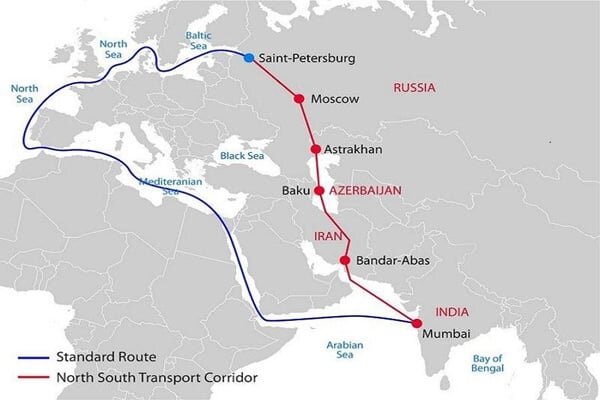INSTC: A sanction-proof route with great economic prospects

TEHRAN – Earlier this week, the first Russian cargo heading for India via the International North-South Transport Corridor (INSTC) arrived in Iran, making the sanction-proof transportation corridor operational nearly 22 years after it was launched in September 2000.
The transportation of cargo through the INSTC has entered the operational phase after completing a trial phase in June when two 40-foot containers of wood departed from St. Petersburg toward Nhava Sheva Port in India.
Traveling from the Astrakhan Port in southern Russia to the Iranian ports of Anzali on the Caspian Sea and Bandar Abbas on the Persian Gulf, the consignment successfully reached the west coast of India earlier this month.
The formation of INSTC
The idea for the formation of the multi-modal network of ships, rail, and roads for moving freight between Eastern Europe and South Asia was provided by Iran, Russia, and India at the Euro-Asian Conference on Transport in St. Petersburg on September 12, 2000.
The three countries had signed an agreement among themselves earlier in May that year to pursue the project.
Later, Turkey, Oman, Syria, Belarus and Ukraine, Tajikistan, Kyrgyzstan, Kazakhstan, Armenia, and Azerbaijan also joined the agreement, while Pakistan, Turkmenistan, and Afghanistan are also interested in using this transport corridor.
Although, after the initial agreement, the member countries started to improve their infrastructure to make the route operational, but the project started to be actively pursued only after the formation of the Eurasian Economic Union (EAEU) free trade agreement in 2015.
Later on, despite all the interest and hype, the attention to the route faded once again due to geopolitical hurdles including the global economic stagnation, the U.S. sanctions on Iran, the conflict in Karabakh, and the pandemic.
Now, the intensification of the conflict in Ukraine and the imposition of international sanctions on Russia has made the need for an alternative logistics route between Eastern Europe and Asia felt more strongly.
Advantages of INSTC
Aside from the fact that INSTC is more cost-efficient and saves a great amount of travel time, the positioning of the INSTC as an alternative to the traditional deep sea Suez Canal route is also another major advantage of this route considering geostrategic and economic diplomacy for all the involving countries, especially Iran and Russia that are both facing U.S. sanctions.
In terms of cost, a study conducted by the ‘Federation of Freight Forwarders Associations in India (FFFAI) found INSTC is “30 percent cheaper and 40 percent shorter than the traditional route via the Suez Canal.”
For Iran, the operation of the INSTC is now more significant than ever as the Islamic Republic is pushing for upgrading a preferential trade agreement previously reached with the EAEU to a free trade agreement.
Aside from the transit capacity that the INSTC would bring the country, the North-South corridor would be a great path for Iran to access the EAEU member countries to fully harvest the benefits of an eventual free trade agreement.
In this regard, the Islamic Republic has already taken several steps to provide the necessary infrastructure for the development of the route both through land and sea.
Having five major rail and road crossings in the INSTC path, Iran can easily realize the prospect of transiting a significant amount of transit goods between the countries along the corridor.
Earlier this week, the Islamic Republic of Iran Shipping Lines (IRISL) announced that it has assigned 300 containers to transport goods between Russia and India.
According to the IRISL, the mentioned containers have been allocated to execute the first phase of a program for transiting Russian commodities to India via the North-South Corridor using the Caspian Sea.
“According to the plans made by the Islamic Republic of Iran Shipping Lines, in the first phase, 300 containers have been considered for transporting cargos to Russia. If the demand increases, the number of these containers will increase continuously,” an IRISL statement said.
The operation of the INSTC is good news for all the involving countries and considering the recent developments in the global economic scene, it is of great importance for the members of the agreement to take all the necessary measures to keep this vital route operational and develop it even further.
EF/MA
Leave a Comment